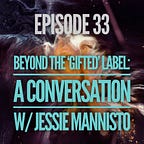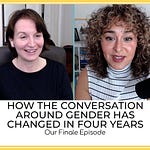Stella and Sasha sit down with Jessie Mannisto, the Editor in Chief of Third Factor Magazine, a publication for and about uncommon people and their uncommon paths through life. Jessie expands on the many overlapping experiences of gifted, creative, intense, and gender dysphoric individuals. They explore some critiques and uses of terms like ‘queer’ and ‘asexual.’ Stella and Sasha ask Jessie about androgyny, loneliness, ordinariness, and exceptionalism in dysphoria people. And what’s up with anime and fan fiction amongst gender-questioning youth?
Links:
Jessie Mannisto on Sasha’s YouTube Channel
Disintegration as an Opportunity for Growth:
Part 1: https://www.youtube.com/watch?v=rGBcqT6h0Pw&t=1081s
Part 2: https://www.youtube.com/watch?v=mFKpuoR9-zg&t=2s
Where Intensity and Gender Dysphoria Meet:
https://www.thirdfactor.org/intensity-gender-dysphoria
Existential Depression in Gifted Individuals:
https://www.sengifted.org/post/existential-depression-in-gifted-individuals
Rainforest mind - Paula Prober:
https://www.amazon.com/Your-Rainforest-Mind-Well-Being-Gifted/dp/0692713107
Hilary Jacobs Hendel - https://www.amazon.com/Its-Not-Always-Depression-Authentic/dp/0399588140
Creativity
https://www.amazon.com/Creativity-Psychology-Discovery-Invention-Perennial-ebook/dp/B000TG1X9C
Third Factor Magazine: https://www.thirdfactor.org/
Twitter: https://twitter.com/thirdfactormag?lang=en
Facebook: https://www.facebook.com/ThirdFactorMag/
Extended Notes
A little bit about Jessie and how she got involved in the field of giftedness and overexcitability.
Jessie noticed a connection between gender dysphoric people and giftedness.
What is the definition of “giftedness”?
There are five domains or key areas where you can be gifted: Intellect, imagination, psychomotor, sensory, and emotions.
How do these domains manifest into those who are extremely gifted?
Although not a reliable measure, overexcitability is often linked to giftedness. One of the ways people tried to test for giftedness was through overexcitability, but it was not conclusive.
What is the “hedgehog dilemma”?
The more that you’re an outlier, the more you try to seek out people who are like you to confirm that you’re “okay” and not abnormal.
Belonging is the biggest issue for these types of people.
What is a “magnet” school?
Most gifted people know they’re difficult and can be hard to manage. Jessie believes some of these gender rules and norms are a reaction to them needing order and relatability in the world.
Overexcitable people often feel very alone and like there’s no one out there who shares their pain.
Putting people together in “gifted” rooms is not the answer. It’s the ability to share common interests together that makes it valuable.
The search for meaning and the search for happiness is too vague.
This is an age-old problem, people want to find someplace they belong.
Jessie was told at a young age to “not intimidate the boys or they won’t like you.” She understands why falling into an androgynous category was so appealing.
Giftedness is such a problematic word, but Jessie didn’t know what was the best word to use at the time. Really, she likes to use “questioner.”
Why is there such an obsession with anime and other fandom among these groups?
Stella wonders if gender, asexuality, and sexual progression are all linked together.
When you don’t fit the perfect image of what a “wife” or “husband” is supposed to be, people look for alternative ways to explain their uniqueness.
Creative individuals are often gender fluid or genderqueer. They often don’t fall into the stereotypes.
This podcast is partially sponsored by ReIME, Rethink Identity Medicine Ethics:
Learn more about our show: Linktr.ee/WiderLensPod











